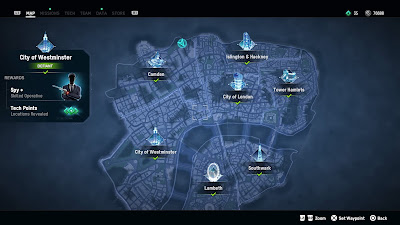Among Ubisoft’s more recent franchises, a relatively lesser-known one that still gets attention is Watch Dogs, which revolves around hacking mechanics and deals with issues of technology. While not my favorite series, I liked it enough that I played Watch Dogs 2, which I found better than the original Watch Dogs, and felt curious after the reveal of the third entry, Watch Dogs: Legion, at E3. However, I still had my reservations and post-release events reaffirmed my choice to avoid pre-ordering it, since its price got halved in only a month. Still, I picked it up for the PS5 as an excuse to use the system and found my chance later, only to walk away wondering if this franchise still has a future.
Dalton Wolfe, an operative from DedSec’s London branch, goes to the Houses of Parliament to disarm bombs planted by the rouge hacker group Zero Day. After he manages to disarm the bombs in Parliament, he is swiftly gunned down by Zero Day’s leader, who sets off additional bombs planted throughout London and forces Sabine Brandt and her AI Bagley, who both lead DedSec London, to go into hiding. This creates a vacuum for the company Albion to effectively transform London into a surveillance state where Bagley is repurposed into an OS that constantly monitors the populace. When Albion fully take over months later and arrest or kill most of London’s DedSec operatives, Sabine finds a new recruit through ctOS and sends them to reactivate the group’s safehouse and Bagley. The new recruit is then tasked with rebuilding DedSec to liberate London’s boroughs and convince the people to defy Albion’s rule.
Following in the footsteps of the previous Watch Dogs games, Legion touches on a lot of subjects regarding the more negative aspects of technology and society’s general overreliance on interconnecting everything, sacrificing safety and liberty for convenience. The story can at times bring up some harsh truths about technology, like how it could enable one of Albion’s plots to use people’s histories and some version of China’s Social Credit System to systematically target and kill individuals without the human element of mercy. However, the story touches on so many aspects of technology at once that it feels disjointed, with multiple threads running at once with varying degrees of payoff. There are flashes of potential, like how the 404 Chapter feels like something out of Black Mirror, but they are few and far between. It doesn’t help that there’s random commentary about the rich and how they live in their own world with access to things most people will never afford, but it’s not developed any further, unlike, say, Hitman 3. The main villain’s final plan also feels like a half-baked version of the movie Summer Wars.
It certainly doesn’t help that there isn’t one central character to follow. Unlike Watch Dogs’ Aiden Pearce or Watch Dogs 2’s Marcus Holloway, Legion doesn’t have a dedicated protagonist. Instead, you can play as pretty much any NPC in the game at the cost of a developed personality, since the player character is obviously written like a blank slate so any of the voice actors can deliver the same lines. As such, it was hard to really get invested in the player character, since the NPCs are so interchangeable within the narrative. The side characters and villains felt more fleshed-out, but aren’t too compelling on their own except for seeing the depths they’ll sink to for their goals.
 |
| Play as anyone! |
If you’ve played the previous games, you’ll have some idea of what to expect from the gameplay. As I played more of the game, however, I had the nagging feeling that it was mechanically empty compared to Watch Dogs 2 and, after doing some research, I realized that it lacked mechanics relating to committing crimes or using the player character’s cell phone. A lot of these mechanics are instead replaced by the game’s most advertised feature to recruit and play as any NPC in London. In theory, this mechanic opens up a lot of different playstyles and approaches to each mission, which actually felt fun to figure out at times. In practice, however, it’s likely you’ll stick with only a handful of recruits that can tackle specific situations, since from my experience you don’t actually need that many. Since the recruitment missions occasionally suggested by the game feel too tedious and repetitive to even bother doing, you’ll also likely prioritize recruiting those with useful passive abilities like shorter arrests or instant hospital recovery. The only other thing that could make the mechanic interesting for some players if they choose to enable permadeath.
 |
| You can preview a potential recruit. |
Combat easily goes from bland at best to tedious at worst. Since DedSec operatives usually start out with non-lethal stun guns, the game subtly encourages the nonlethal route for taking out human enemies. It’s not a bad idea, but some NPCs come with real guns that some players might opt for instead considering that operatives can be kidnapped if enemies are left alive, necessitating a rescue mission to get them back. No matter your approach, however, gunplay doesn’t feel too exciting, especially on a lower difficulty where it’s easier to just aim and get a good shot in. In some missions, the game will simply throw a lot of enemies at you and tell you to survive until a timer runs out, at which point clearing a room will let you move on. It’s not that this type of structure is inherently bad, but it happened more often than necessary. Similarly, the presence of enemy health bars makes the already barebones melee feel more tedious than it should, especially when you’re swarmed.
 |
| You can also avoid combat with the right hacks available. |
When not tackling the story missions, the player’s main goal in London is freeing the eight boroughs from Albion’s control. This is accomplished through completing a set of goals within the area, like photographing evidence or removing propaganda, then speaking with an informant and completing the mission they give you. Though some of the goals required some thought on my part, they didn’t take too much effort and I didn’t feel much of a sense of accomplishment. I felt more invested in the missions that capped it off and the rewards for each borough felt worth the effort, but that didn’t stop some missions from feeling underwhelming.
I also didn’t feel consistently engaged by the main and side missions. Some items are cleverly placed for hacking, and even lead to flashes of brilliance like hacking a car to drive backwards off a ledge and take care of a terminal, but for the most part it feels rather repetitive. Sometimes it felt like multiple buildings had the exact same layout and there wasn’t too much variety with mission types. Sometimes the story chapters don’t have a good payoff. One example that stands out is the boss fight against Nigel Cass. Hacking while outgunning Albion soldiers and dodging gunfire actually felt intense at times, but Nigel Cass himself went down in only a few shots.
In general, the times I got the most enjoyment out of the missions came from the hacking puzzles. I liked having to exercise my brain to work out where the flow of energy would go and I loved the idea of doing a lot without having to set foot into a building. Unfortunately, since the hacking mechanics were scaled back a bit, I didn’t have as much fun doing it as I did with the previous games.
Completing missions and doing various things out in the world of London, like tagging hard to reach places, earns you plenty of ETO, one the game’s currencies. However, there isn’t much you can do with ETO outside of buying cosmetic items, of which there are plenty. You can also find and earn the more valuable Tech Points, which upgrade DedSec’s collective Tech and Abilities to help level the playing field against Albion’s forces. Apart from this, there are other collectables that provide some extra world building but otherwise exist primarily as a way of padding out the game length.
 |
| Tech Points are far more useful than ETO. |
Navigating London isn’t too hard once you can fast travel using the city’s Tube system, but it only works if you’ve already set foot in that part of the map, which means driving. Driving relies on some rather odd physics that never feel quite right no matter what vehicle you drive. Motorized scooters are the worst, since it’s too easy to start driving and then fly forward several meters from bumping into the wrong object. You can avoid most troubles with the auto-driving feature on most cars, but it can feel a bit slow when your destination is particularly far away. For better or worse, you can also freely commit crimes in front of NPCs, since no one will report you to any guards or soldiers. Even when you do get a wanted rating from Albion, outrunning then isn’t particularly hard and you’d have to try really hard to get higher than a level two rating.
 |
| At least the map is more manageable than Assassin's Creed: Odyssey. |
Much like many of Ubisoft’s other AAA titles, Watch Dogs: Legion features microtransactions for in-game currency, cosmetic items and time savers. You can easily ignore them, but there are also three recruits locked behind real money, which immediately makes this system pretty scummy.
 |
| A selection of what you can get with real money. |
 |
| The Digital Knights admittedly look pretty cool. |
 |
| Three exclusive operatives. |
Since I played Legion on a PS5, I can attest that the graphics are impressive, though I wasn’t sure how well they fully took advantage of the system outside of better lighting and adaptive triggers. London also looks like London as far as I could tell and the general aesthetic of Watch Dogs is retained. However, there are some noticeable limitations on what the game can do, like the occasional clipping, odd draw distance and texture pop-in or not knowing where to draw certain NPCs. I’m not sure what this says about the development of the game, but it certainly says something. In any case, the NPC relationship tags, while cool in concept, had a habit of staying onscreen even when it didn’t make sense, which quickly got annoying.
 |
| This happened once. |
 |
| A blank wall... |
 |
| ...until you take a couple steps forward. |
I also feel mixed on the audio. Bagley’s voice acting was fine and suited his role well, but the rest of the NPCs are just okay. None really stand out too well and I don’t have enough knowledge of how Londoners speak to know if the patterns and dialects were accurate. What really bothered me, however, was the lack of a music player or customized playlists, as in the previous games, so I wouldn’t have to drive to actually appreciate some of the tracks. Some did stand out, like “Domino” by Turbowolf, but I didn’t get to actually hear most of the tracks. In any case, despite its possible thematic resonance, I felt some relief that “London Calling” by The Clash wasn’t blindly thrown in, as I feel the song was overused in media set at least partially in London.
Watch Dogs: Legion is a testament to great ambition with disappointing results. Its
disjointed story, mechanical emptiness and repetitive structure feel like a big
step back and shows that Ubisoft still doesn’t quite know what they want from
the series. Exploring London can have its charms, but the experience certainly
isn’t worth full price. Even if you’re an existing fan of the series, consider
holding off for a sale or waiting to see if any future patches improve
anything.



No comments:
Post a Comment